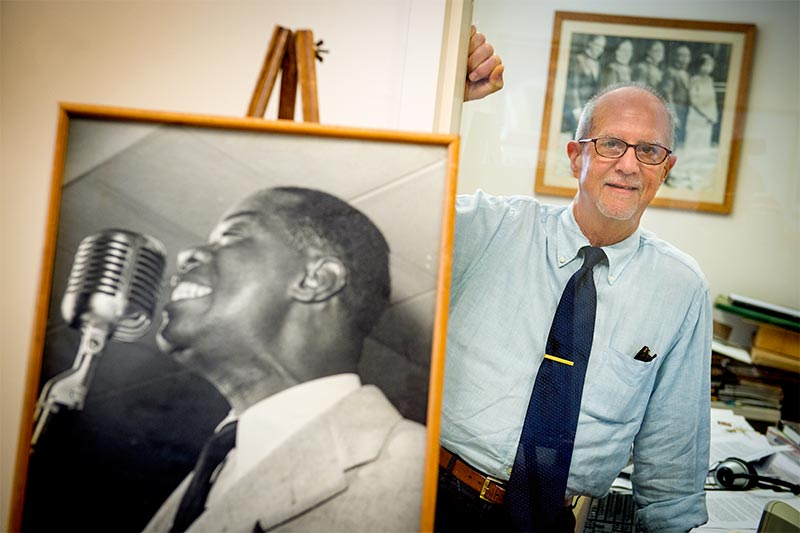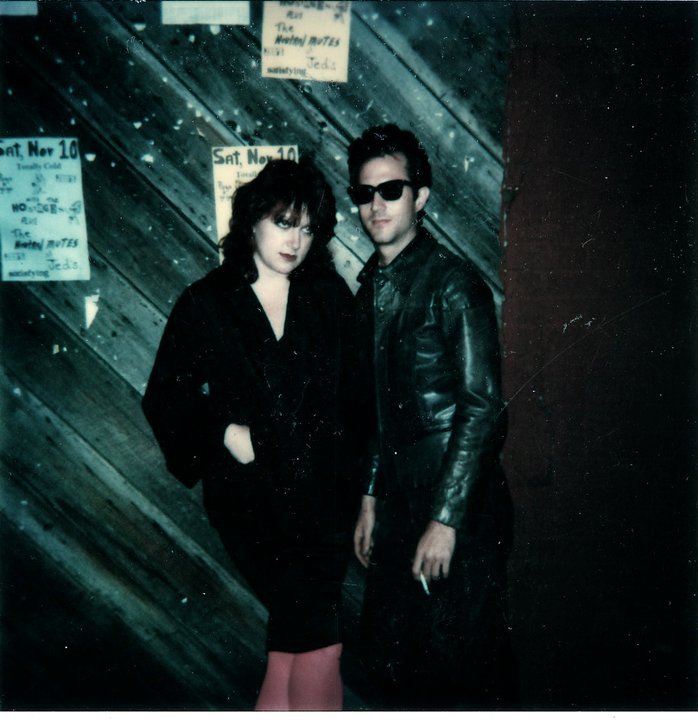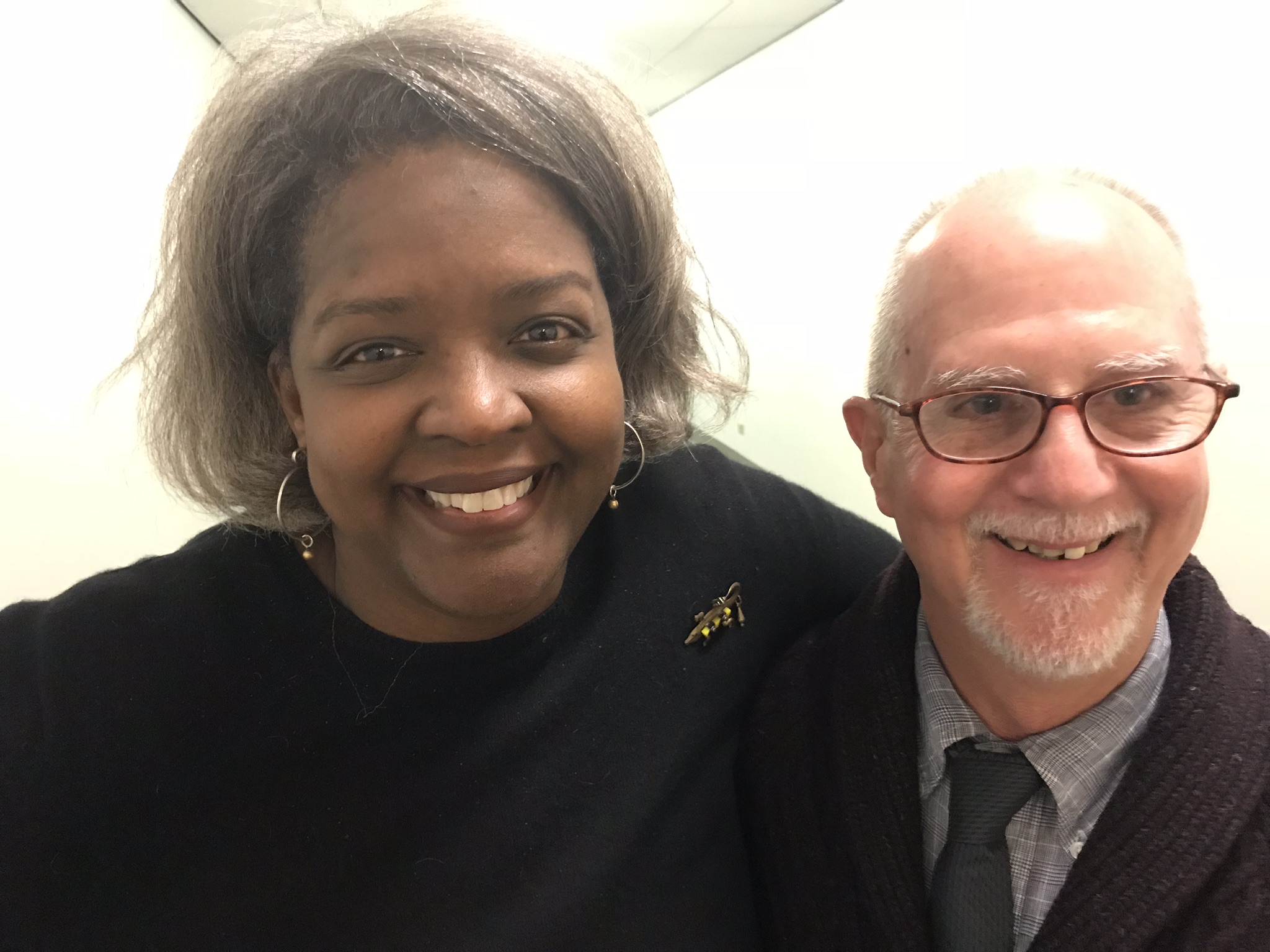
Bruce Raeburn
“Every Guy That Played Jazz Needs to Be On the Table”
Bruce Boyd Raeburn is known to most people as the curator of the William Ransom Hogan Jazz Archive at Tulane University, a position he held from 1989 until his retirement on January 1, 2018. Together with his inspired and devoted team of researchers, Lynn Abbot and Alaina Hébert, he helped make “the little engine that could” into a accessible treasury of New Orleans jazz history and a unique public resource where academics, musicians, and enthusiasts alike could connect with the men and women who shaped the sounds of the city.
When he wasn’t sitting behind his desk at the archive, Bruce could often be found basking in the sun at a table outside the PJ’s Coffee House on Tulane’s campus, always friendly, helpful, and ready to share a story about the great men and women of New Orleans jazz.
But Raeburn also would remind us that the story of jazz isn’t just about the greats: “I think when we talk about jazz history, every guy that played jazz needs to be on the table,” he said in our interview. “We need to look at all of them. We need to be serious about the context in which we place those individuals.”
For our show, Raeburn is also sharing his story – one that sent him from his childhood home in New York City to the Bahamas, the West Coast, and eventually to New Orleans.
Connect with the Hogan Jazz Archive
Playlist
Every week, we provide a playlist of the music heard on our program. Please support your local musicians and record stores.

The first time I saw Bruce Raeburn, I wondered what he was doing fooling around with the past. It was the late 1980s, and the plastered rooms of the William Ransom Hogan Jazz Archive at Tulane University were eerily quiet — as silent as what the interior of a cotton bale might sound like — with only the occasional burst of a heavy 78 rpm record shaking a glass-bound listening room. Raeburn looked loud — and strangely cool — amid the stacks of hot jazz and piles of blues records in need of cataloguing. He was wearing a black leather jacket and jeans and carrying a motorcycle helmet. He sported boots and dark sunglasses. Turns out, he was a rocker. And, this being academia, he was a rocker on a budget.
“The amount of money you get paid to teach as a TA (teaching assistant) at Tulane is not huge and so a car was pretty much not affordable,” Raeburn said in our recent interview at the archive, which is now in a different location on campus and only slightly more animated. “My stepmother … loaned me the money to get a Honda 305 Scrambler.”
The bike was an incentive for Raeburn to remain with her in Lafayette after his father died there in the mid-1960s. His five years in Southwestern Louisiana proved seminal. “I discovered really indigenous ethnic music and that was a game changer for me,” Raeburn said. “That just turned my head around and I could kind of date my career as someone interested in the archiving or the historical documentation of cultural history with an emphasis on music from that point.”
Lafayette is also the place where Raeburn learned to play the drums. Upon moving to New Orleans to earn a PhD in history at Tulane, he joined a rock band called Ritz Hotel, featuring Clark Vreeland and Steve Cunningham on guitar, Tim Youngblood on keyboard, Becky Curry on vocal and Reggie Scanlan – later of the Radiators and the New Orleans Suspects – on bass. Raeburn then played jug band music with the Wheeler Sisters on Thursday nights uptown at the Maple Leaf Bar. He joined a punk-influenced band called Room Service and performed with New Orleans piano wizard James Booker, a local New Wave band called The Mechanics, as well as with The Driveways, who — in those days — played on the same bill as a young and rising U2. For many years, Raeburn also played with Skip Bolen, who recently wrote on Facebook, “Bruce Raeburn was the drummer in my experimental-art, post-punk, alternative rock and avant-garde band The Front … Will definitely miss seeing his face in New Orleans!”
So for all that time, including 38 years as curator of the Hogan archive, Raeburn was living a double life — by day after soundless day at the archive and by nights and weekends providing a back beat to an ever-widening palette of rock ’n roll. He also founded his own band, Shot Down in Ecuador Junior. Don’t worry, no one else understands the title, either. But it has something to do with a similarly titled hair salon in New Orleans.
“What we attempted to do with both punk and New Wave was to present an alternative to the roots rock that was taking shape with the Radiators and Neville Brothers and these things coming out in the 1970s,” he said. “We really wanted to show that there was a whole other aspect, a whole other energy to be explored by New Orleans musicians. So our models were still what was happening in England and the U.S., for the most part. It was a different energy and one that appealed to me.”
Now, Raeburn, 69, says, someone else performs under the handle Shot Down in Ecuador, Junior. “I went on YouTube looking for our stuff and found him. It’s like a busker or something.”
But punk and New Wave music aside, it’s impossible to tease the New Orleans out of any local musician. In the winter, Raeburn played a few dates with local bands, rocking the music of Fats Domino, Chris Kenner and Lloyd Price.
“They have a guitar center in Spokane, so I might tiptoe in there one day and see if there are any opportunities for a New Orleans drummer,” Raeburn said just before leaving the city for good. “But these may be my last gigs, so I’m enjoying them.”
— Gwen Thompkins

Heroic Feats in Brass
When we sat down and spoke with Bruce Raeburn, he waxed poetic over a vast array of subjects… So many, in fact, that we had to leave several out of our show! At one point, the conversation ventured to the topic of cutting contests, public showdowns between competing horn-players. In this web-exclusive audio, Raeburn draws a connection between historic and the modern brass competitions, and highlights one brass band in particular.
Listen here:
Bruce Raeburn On “Cutting Contests” and the Pinnettes
